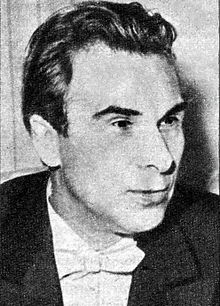Rudolf Kempe

Rudolf Kempe (14 June 1910 – 12 May 1976) was a German conductor.
Biography
Kempe was born in
Leipzig Gewandhaus orchestra, from 1929. In addition to oboe, he played the piano regularly, as a soloist, in chamber music or accompanying, as a result of which, in 1933, the new Director of the Leipzig Opera invited Kempe to become a répétiteur, and later a conductor, for the opera.[1]
During the
Second World War Kempe was conscripted into the army, but instead of active service was directed into musical activities, playing for the troops and later taking over the chief conductorship of the Chemnitz opera house.[1]
Career
Opera
Kempe directed the Dresden Opera and the
Die Meistersinger and Der Freischütz. 'He obtains some superlative playing from the Dresden orchestra,' commented The Record Guide.[2]
He maintained a relationship with the Dresden orchestra for the rest of his life, making some of his best-known records with them during the stereo era.
His international career began with engagements at the
He was invited to succeed
Un Ballo in Maschera and Madama Butterfly, of which the critic Andrew Porter compared Kempe's operatic conducting favourably with that of Arturo Toscanini and Victor de Sabata.[3]
As a guest conductor, Kempe frequently revisited Munich conducting mostly the Italian repertory.
Kempe's début at the Bayreuth Festspielhaus was in 1960. The Ring cycle he conducted there in that year was notable for multiple casting, with the role of Wotan split between Hermann Uhde and Jerome Hines, and Brünnhilde between Astrid Varnay and Birgit Nilsson.
Orchestral
Kempe was associated with the
Royal Philharmonic (RPO) from 1955. In 1960, he became its Associate Conductor, chosen by the orchestra's founder, Sir Thomas Beecham.[4] In 1961 and 1962 he was Principal Conductor of the RPO, and from 1963 to 1975 its Artistic Director. A member of the RPO later said of Kempe, "He was a wonderful controller of the orchestra, and a very great accompanist ... Kempe was like someone driving a racing-car, following the piano round the bends."[5] Kempe abolished Beecham's male-only rule, introducing women into the RPO: an orchestra without them, he said, "always reminds me of the army."[1] The first was violinist Christa Ruppert.[citation needed] In 1970, the RPO named him Conductor for Life, but in 1975, he resigned his post with the orchestra.[6]
From 1965 to 1972 Kempe worked with
Beethoven
symphonies.
In the final months of his life, Kempe was the chief conductor of the
Henry Wood Promenade Concerts on 16 July 1976, in which he was to have conducted his BBC forces in Beethoven's Missa solemnis, became a memorial concert for him following Kempe's death in Zürich, two months earlier, aged 65.[7]
References
- ^ a b c d e f Alan Blyth (February 1974). "Rudolf Kempe interview and profile". The Gramophone. pp. 1, 547.
- OCLC 59019008.
- ISBN 0-00-211163-2.
- ^ R.E. (1976). "Rudolf Kempe: Obituary". The Musical Times. 117 (1601): 596.
- ISBN 0-354-04420-6.
- JSTOR 962474.
- ISBN 0-563-17697-0.
External links
Wikimedia Commons has media related to Rudolf Kempe.
- Rudolf Kempe at AllMusic

